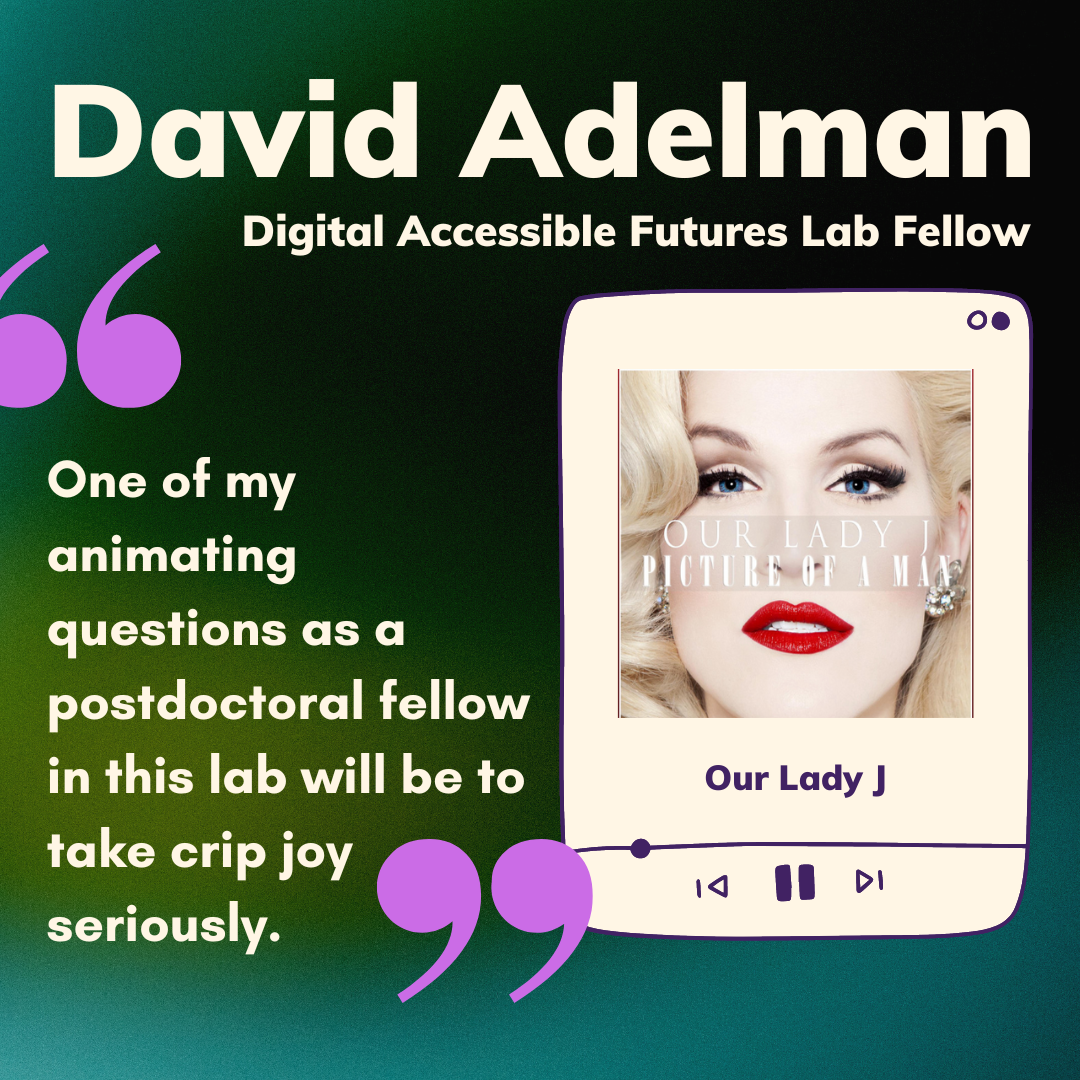Meet our DISCO Network Fellows: David Adelman
David Adelman is DISCO’s Digital Accessible Futures Lab Fellow.
Q: Can you tell us about your research?
David: In many ways, as with all of us, my work is deeply interdisciplinary. I do disability media studies by way of crip theory and feminist disability studies, with a deep focus on disability culture and cultural production. I investigate the cultural and technological discourses, infrastructures, and access knowledge that emerge around disability; particularly in the culture industries. And, I work to imagine anti-ableist and anti-racist futures, even as we recognize systemic oppression and inequity in our current moment. Outside of a theoretical preoccupation with power, privilege, and everyday life (although I would humbly submit that indeed, there is no “outside” to theory) I also am interested in critical/creative synthesis. And, I use digital media/experimental video/remix to invite publics to reimagine their relationship to disability, and to the disabled body.
Q: What drew you to this work?
David: To borrow Robert McRuer’s terminology, I am a “severely” disabled man. That is, I am both significantly disabled—I have cerebral palsy, and I am a power wheelchair user—And I am interested in using my visible disability as a material foundation to imagine crip futures. I am also queer. In that sense, I identify as a Queercrip individual, and as such, much of the vivifying energy that animates my work is personal. Specifically, I work to excavate and understand the historical dimensions that inform socio-cultural attitudes towards disability and other minoritized bodies. On the purely functional level, it was a combination of reading Robert McRuer’s Crip Theory and Liz Ellcessor and Bill Kirkpatrick’s Disability Media Studies that was my “Lightbulb” moment. These works provided the vocabulary through which I could articulate my experience, and begin to articulate theory in a way that felt like an extension of myself.
Q: What will you be doing this year through the DISCO Network and the Digital Accessible Futures Lab?
David: The University of Michigan and the DISCO network have access to so many deep resources. I am grateful. This year, I want to dive deeply into questions of critical accessibility and equitable access. So often, “access” is understood within an incredibly narrow frame, usually determined by a technical-juridical context, especially in the United States, with the prevalence of discourse surrounding the Americans with Disabilities Act. This lab is an opportunity to expand our understanding of access beyond technical frames, as important as those are, to imagine pedagogies that are rooted in disability justice, and to imagine disability community and resource sharing and mutual aid differently. I am also excited to use the lab's resources to explore ways to provide access and transparency to disability media writ large. For instance, thinking critically and creatively about what it means to engage concepts of crip time and crip joy. In fact, one of my animating questions as a postdoctoral fellow in this lab will be to take crip joy seriously. What does that look like being a world submerged in pandemics, online and off?
Q: What excites you these days?
David: The possibilities of what I call “Crip Envy,” particularly in online/virtual environments. I position this as an alternative to what Stella Young termed “inspiration porn”—it's also a deliberately frictional term. It gestures towards the intersection of socioeconomics, race, gender, and other attributes. This is an outgrowth of my dissertation work and something that I will be developing during my time as a DISCO fellow. I am also compelled by the ongoing technocultural developments surrounding our practices of visualization and reception as it relates to disability. As a scholar, questions of “good” and “bad” representation are less interesting than the infrastructures that exist underneath the surface that give rise to these representations, which afford certain possibilities, while foreclosing others.
Q: What’s on your writing playlist?
David: I am heavily reliant on voice dictation software, so I do not typically write to music. However, there are some exceptions. Typically, orchestral/instrumental music is less disruptive to voice recognition software. As such, I will often turn toward movie soundtracks to provide a rhythm to think against. I am a big fan of Brian Tyler’s score for the early 2000s adaptation of Frank Herbert’s Children of Dune. Also, anything by Our Lady J.
Q: What are you reading at the moment?
David: 'The Digital Closet: How the Internet Became Straight' by Alexander Monea, and Bo Ruberg’s 'Sex Dolls at Sea: Imagined Histories of Sexual Technologies.'
Q: What are you looking forward to the most during your fellowship at the University of Michigan?
David: U-M has a deep history of disability studies, in addition to all of its other resources. I hope to take advantage of that history. Put differently, the University of Michigan offers an opportunity to think and create in community with other people where disability is not “new” or “en vogue.” Rather, there is a strong historical commitment to the discipline and disability studies methodology. I fully intend to immerse myself in the opportunities for scholarly growth and public engagement.
